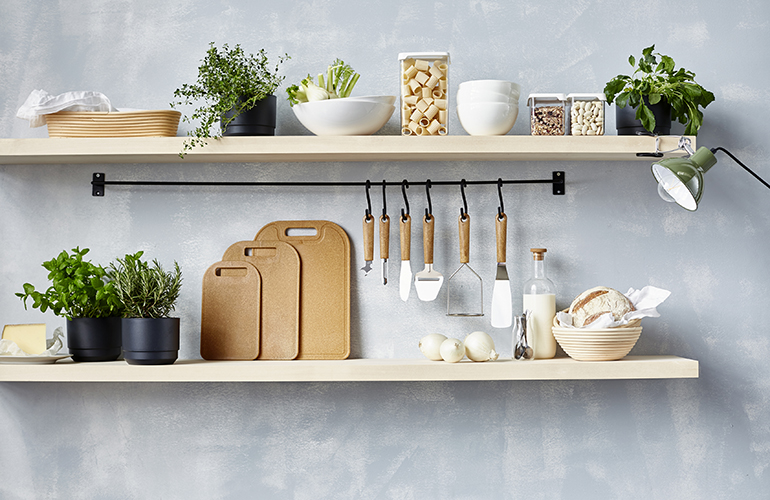
This year, Stora Enso launched the cost-competitive wood fibre composites DuraSense™ by Stora Enso, which have the potential to replace a large portion of fossil-based plastic in consumer goods and industrial applications. DuraSense composites are being produced at the Hylte Mill in southern Sweden, which is expected to have the largest capacity in Europe dedicated to wood fibre composites.
Potential applications for DuraSense include furniture, pallets, hand tools, automotive parts, beauty and lifestyle products, toys and items such as kitchen utensils and bottle caps. Stora Enso will focus in the first year on furniture, storage and logistics segments. In addition to reducing plastic consumption and carbon footprint, Stora Enso’s wood fibre composites can be recycled, re-processed and re-molded for another product, or alternatively, used for energy recovery at end of life.
tora Enso and Orthex bring to the market a new range of kitchen utensils made from a new biocomposite which combines the best qualities of wood and plastic. The DuraSense™ by Stora Enso biocomposites are produced from spruce and pine from sustainably managed and certified Swedish forests.
Responding to trends and changing expectations in online retail, Stora Enso has also introduced an online retail packaging portfolio, e-TALES by Stora Enso. The porfolio provides smart features for the consumer and improved economic and environmental performance for the retailer. Renewable and reusable material, filler and waste reduction, and optimised handling are key advantages. Carry handles, easy opening and resealing and adjustable sizes, for example, are small ways to make big improvements in the consumer experience as well as to support e-tailers.
For e-tailers, e-TALES Utilities supports workflows at distribution centres. e-TALES Services focuses on solutions for automation and intelligent packaging.
Based on continuing developments around lignin and the production of quality kraft lignin in industrial quantities at Sunila Mill in Finland, Stora Enso has launched Lineo™ by Stora Enso. This is a wood-based replacement for oil-based phenolic materials used in resins for plywood, oriented strand board (OSB), laminated veneer lumber (LVL), paper lamination and insulation material.
Lignin is a stable and safe alternative to phenols, with a similar performance. Calculations of carbon footprint of phenol-based versus lignin-based have shown very positive results – reductions up to 80%. Gaining recognition, Lineo was named “Bio-Based Product of the Year” at the Bio-Based World News Innovation Awards 2018.
Market interest in Natura Life™ by Stora Enso continues to grow. This cartonboard was launched in the latter half of 2017, as the result of a cooperation with a major customer and responding to consumer trends for ethical, ecological and organic products. Natura Life retains the natural brown colour of the wood fibres and has a visible fibre structure. Due to its lightness, less raw material is required in production. It is 100% recyclable and recyclable through existing channels, and this new package can reduce CO2 impact by 24% compared to competitive solutions.
While the paper brand Multicopy was celebrating 40 years on the market, Stora Enso introduced Multicopy Zero® by Stora Enso, a carbon-neutral paper for office machines. Multicopy Zero offsets the emissions generated during manufacturing and distribution, accounting for the entire life cycle of the paper from forest to mill and end-user. For customers, Multicopy Zero is a strong differentiator by providing ways to reduce carbon in their own business equations.
Coming soon, Stora Enso will follow on its building systems for residential multi-storey buildings with a new concept for commercial offices. Building Systems by Stora Enso help to enable customers in the construction sector to build using wooden components like CLT and LVL. Wooden buildings bring many benefits, among them, cleaner and more efficient construction, less site waste and noise, reduced carbon emissions in production aspects when compared to alternatives, lower logistical costs as timber weighs less than that of reinforced concrete, and storage of carbon throughout the lifecycle.
Altogether, these launches attest to the potential of innovative, competitive solutions based on renewable materials to meet the demand for more eco-friendly solutions as a response to the world’s materials challenges.







